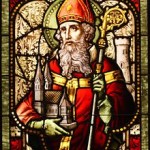* * * * *
 “Patrick was born in Britain of a Romanized family. At age 16 he was torn by Irish raiders from the villa of his father, Calpurnius, a deacon and minor local official, and carried into slavery in Ireland, where, during six bleak years spent as a herdsman, he turned with fervor to his faith. Hearing at last in a dream that the ship in which he was to escape was ready, he fled his master and found passage to Britain. There he came near to starvation and suffered a second brief captivity before he was reunited with his family. Thereafter, he may have paid a short visit to the Continent.”
“Patrick was born in Britain of a Romanized family. At age 16 he was torn by Irish raiders from the villa of his father, Calpurnius, a deacon and minor local official, and carried into slavery in Ireland, where, during six bleak years spent as a herdsman, he turned with fervor to his faith. Hearing at last in a dream that the ship in which he was to escape was ready, he fled his master and found passage to Britain. There he came near to starvation and suffered a second brief captivity before he was reunited with his family. Thereafter, he may have paid a short visit to the Continent.”
“The best known passage in the Confessio, his spiritual autobiography, tells of a dream, after his return to Britain, in which one Victoricus delivered him a letter headed, “The Voice of the Irish.” As he read it, he seemed to hear a certain company of Irish beseeching him to walk once more among them. “Deeply moved,” he says, “I could read no more.” Nevertheless, because of the shortcomings of his education, he was reluctant for a long time to respond to the call. Even on the eve of embarkation for Ireland he was beset by doubts of his fitness for the task. Once in the field, however, his hesitations vanished. Utterly confident in the Lord, he journeyed far and wide, baptizing and confirming with untiring zeal. In diplomatic fashion he brought gifts to a kinglet here and a lawgiver there but accepted none from any. On at least one occasion, he was cast into chains. On another, he addressed with lyrical pathos a last farewell to his converts who had been slain or kidnapped by the soldiers of Coroticus.”
“The phenomenal success of Patrick’s mission is not, however, the full measure of his personality. Since his writings have come to be better understood, it is increasingly recognized that, despite their occasional incoherence, they mirror a truth and simplicity of the rarest quality. Not since St. Augustine of Hippo had any religious diarist bared his inmost soul as Patrick did in his writings. As D.A. Binchy, the most austerely critical of Patrician ( i.e., of Patrick) scholars, has put it, “The moral and spiritual greatness of the man shines through every stumbling sentence of his rustic Latin.” (http://www.biography.com/people/st-patrick-9434729?page=1)
What was said of Abraham is also applicable to Patrick. Each man in his own way became the “father” of a host of nations. Each man is his own way also mirrors Jesus by refusing to bring glory to himself in his daily attempts to follow God’s will and to be an instrument of God’s love in the lives of others.
How might we – in little, simple, ordinary ways – be as “fathers” and “mothers” not so much to a host of nations, but to the people with whom we will interact just this day?